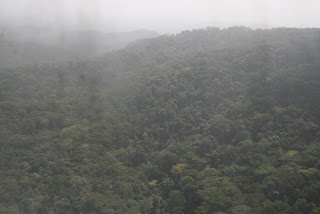It was obvious I needed a true break so I decided to come to Monrovia and see Jamila off at the airport (or rather, the shuttle that was taking her to the airport.) I was actually in Monrovia three weekends ago (my first time back since arriving in the country- I was in some dire need of supplies) but unfortunately it was not as relaxing as I had hoped. In Voinjama, I live and work in the same place- this is also the case in Monrovia. There is no separation between one's work and personal life and since I have no driving rights, I am completely dependent. One would think that just going to Monrovia would be a nice change of scenery, but the fact remains that I am still confined to a compound and I am living with my boss. Also, there is no public transport in Monrovia (Liberia never fails to baffle me) and it is quite unsafe as there have been more armed robberies and hijackings reported. Walking around really isn't an option, because well, walking anywhere worthwhile would take a good hour, and then again, there is that pesky security situation. I drove to Monrovia on a Thursday with the intention of taking the UN flight back on Monday. Alas, on Monday we got stuck in traffic and I missed my flight which meant that I could either book another flight for 3 days later, or I could go around begging to other NGOs and try and hitch a ride back with them- which is actually what happened. Tuesday morning I was able to get a ride back with IRC- 10 hours of crappy roads stuck in the middle of an overcrowded vehicle. I have never been so happy to get back to the bush. I literally could not stand the thought of staying another night in Monrovia.
The next two weeks were volatile ones; work wise things were great, but everything else was becoming unbearable. The realization that Jamila only had a week left, people I thought could be trusted turned out to be creeps, and I was becoming so suspicious of people that I was in a constant state of uneasiness and felt that there was no one to trust. A horrible realization. Its not even that I don't like Liberia (which, I really don't), its that I don't like ME in Liberia. I've become disillusioned, skeptical, untrusting, angry, hardened. After one such conversation with Jamila she said "you're changing-you need to get out of here" and so I booked a flight back to Monrovia the very next day. This time, though, we decided we would stay with a good friend of Jamila's cousin, a Ghanaian and chief accountant for USAID.
This past weekend was exactly what I needed- a TRUE break. I was separated from VIA for the first time in 6 weeks and I finally felt at ease. Also, the fact that Toni's apartment was on the top floor overlooking the ocean with 24 hour power, internet, air conditioning, and, get this, RUNNING WATER didn't hurt matters either. I was in culture shock. He had carpet, juice, even an $8 jar of Nutella- a luxury way out of my budget. We ate three times a day (in Voinjama I've trained myself to get by on one meal a day), took showers, flushed toilets, ate fresh fruit, swam in the pool, and watched TV. It was surreal- I took pictures of the breakfast. Cheerios! Real milk (not powerded)! Tea and coffee! Being at Toni's allowed me to untagle myself from the mire of my situation and reevaulate with a clear mind. I made a decision, said goodbye to Jamila, and on Monday morning, I boarded the helicopter to go back to Voinjama. Well, I attempted to board the helicopter when the Ukrainian pilot said "Ve are sorry, ve are having some problems, please vait outside." Then a man stepped on board with a huge screwdriver and started banging away in the back. GREAT, deep down I always knew Liberia was going to get me in the end. After 20 minutes of waiting on the tarmac, we watched the mechanics take apart the top of the helicopter and then flames, yes flames, shot out. And with that they ushered us back on. Miraculously, I made it back safe and sound.
It really is amazing how easy it is to make the back-and-forth transition between the lap of luxury and the grasp of povery and so here I am. In Voinjama. Alone. My time back in Voinjama has also given me time to evaluate and reflect on my decision, and I feel that I have made the right one. Over the weekend I gave my two weeks notice and I will be returning the end of March. I never really settled in and each day was a struggle to get through. I am terribly disappointed, I really wanted it to work out, to love it and want to stay forever. But I don't. And so I feel that this decision was the best one and I did it for me. No regrets. Not quite sure what I'll do once I get home other than some hard-core job searching, but I suppose that will work itself out. Once again, thank you so much to everyone that has encouraged me, supported me, and kept me in your prayers. I would not have made it as far as I did without you. I will be seeing you soon.
 My first UN flight
My first UN flight

The Voinjama "airport". Roofs are overrated anyway.....

The view from above. I think I counted a total of 5 villages on the flight down. Just another reminder of how isolated Voinjama really is.